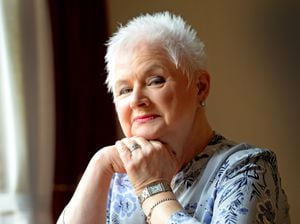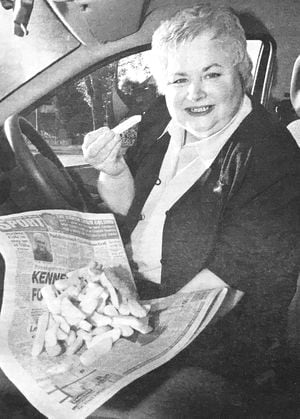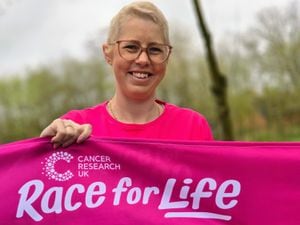260 miles for fish and chips: What it's like to live with coeliac disease
Fifteen years ago Janet Foster hit the headlines for taking a 260-mile round trip from Wolverhampton to Leeds for fish and chips.

At the time it was one of the few places where she could indulge in the treat because she has coeliac disease.
This life-long condition means her body has an adverse reaction to gluten which is found in wheat, rye, oats and barley so Janet couldn't just pop out to her local chippie.
Now there is far more choice of gluten-free foods available in both restaurants and supermarkets says Janet, who is supporting the Coeliac UK Awareness Week which starts on Monday.

"When I diagnosed in 2001, Sainsbury's was only just starting its Free From range and it was the first supermarket to have one. The shopping used to take twice as long as a normal shop because every label had to be checked.
"EU regulations have been a godsend for coeliacs because producers have to list all of the allergens that are present now. Back in 2001, if you bought coleslaw and there was gluten in the mustard used as a thickener they wouldn't have to list it because it was such a small amount.
"But it could make a coeliac very ill. Now everything has to be listed and the choice and ranges of gluten-free products has come on leaps and bounds," says Janet.
No cure
Coeliac disease affects at least one in 100 people in the UK and in Europe, however, only 30 per cent of people with the condition are currently clinically diagnosed. There is no cure for the condition and the only treatment is a strict gluten free diet for life.
But often the symptoms are mistaken for other conditions and there are misconceptions such as a belief that only children are affected when actually it can develop at any age.
It took 26 years of being seriously ill with severe stomach cramps and diarrhoea before Janet was diagnosed at the age of 45, as doctors believed she was suffering from irritable bowel syndrome (IBS).
"For years and years I went backwards and forwards between the doctor and the hospital with it being mistaken for IBS. They said it was caused by stress but I didn't feel I was stressed as I had nothing in my life to be stressed about.
"I worked in Dudley and I knew every toilet stop on the way, every supermarket, pub and McDonald's. I always had a plan of where I could go if I needed to stop.
'Horrendous'
"It was just horrendous. Going out for a meal wasn't a pleasure. I was anxious on holidays because I couldn't enjoy them as I didn't know where the next toilet would be. I couldn't go on day trips on coaches because what if there wasn't a toilet?
"I was eating arrowroot biscuits and toast as well which were supposed to help the IBS symptoms but without realising it this was fuel for the fire because they contained gluten. I had horrible gripping stomach pains," explains Janet, who lives with her husband Geoff.
Then one day she passed a branch of Holland & Barrett which was advertising free allergy tests.
"The hospital had told me I might need a colostomy bag which had shocked me. I knew I couldn't be stressed because apart from this I had a happy life. So when I saw this sign, I thought 'nothing ventured, nothing gained'. I had nothing to lose.
"The test came back saying I had a problem with wheat. I immediately stopped eating bread, biscuits and cakes, anything that obviously looked like it contained wheat and I found some gluten-free bread in Blackheath," says Janet, who is a member of the Wolverhampton Coeliac UK Group.
And it wasn't long because she started to see the benefits of changing her diet.
"I noticed I looked and felt better. I wasn't as bloated, I wasn't running to the loo all the time and I wasn't in as much pain. I looked up wheat allergy in the medial encyclopedia and it said coeliac disease. I read the section and thought 'that's me, that's describing me'," says Janet.
No looking back
She went to the doctors for a blood test for coeliac disease which hadn't existed when she first fell ill. "I didn't fit the bill for coeliac disease and it's a good mimicker of other conditions. Nobody looked at what I was eating." explains Janet.
Once her diagnosis was confirmed, she switched to a permanent gluten-free diet. "There was no looking back. I was lucky that my mother had taught me to cook from scratch so this is what I did to make sure I didn't have any gluten. I didn't have takeaways or ready meals and I was very careful and still am today," says Janet.
Over the years she has helped to raise awareness of the condition and also campaigned for a wider range of gluten-free products.
This included writing to the then-managing director of Costa Coffee asking when gluten-free items would be available. "I told him that while everybody else was tucking into paninis and muffins, I had to eat pieces of gluten-free toast that I had sneaked in in my handbag.
"He wrote back saying it would be impossible. But now I can have biscuits, brownies, Bakewell tarts, sandwiches and salads so there have been massive changes," says Janet
And when she invited to a Queen's Garden Party she wasn't about to go hungry and requested a gluten free meal. "I wanted to show that you can ask anybody for a gluten-free meal - even the Queen," Janet says.
Eating out as also become much easier but Janet, who carries cards written in different languages explaining her condition and what she can't eat, says it always pays to be cautious.
"Some places make it really easy and have gluten-free menus while other places you might have to ask more questions. Every time you eat out you take a leap of faith that the chef that day hasn't added a secret ingredient - like his mother always added a spoonful of flour to a sauce to thickened it so he does that too.
"It's not a disaster if my husband's steak is over-cooked but it is if I'm given gluten so it's always best to be sure. More and more restaurants are realising the implications of giving people something they can't eat," says Janet.
Coeliac UK’s Awareness Week runs until Sunday and more information is available at www.coeliac.org.uk





